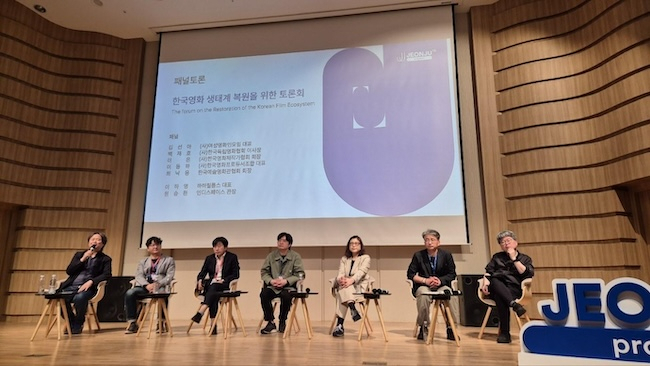 |
“The Roundup: Punishment” (ABO Entertainment) |
While ticket sales of the latest crime action franchise “The Roundup: Punishment” continue to climb toward the 10 million mark, filmmakers criticized the film’s monopoly of screens, occupying over 80 percent of all screens in Korea.
The film is the fourth installment about hot-blooded detective Ma Seok-do (Ma Dong-seok), who this time is on a mission to nab the head of an illegal casino cartel. With no clear rivals in cinemas following its April 24 opening, the movie quickly garnered 8.5 million admissions as of Monday.
Putting a dent in the film's success is the accusation of monopoly being made by local filmmakers, who add that such screen domination is “ruining” the local cinema ecosystem.
“This is a result of what multiplex cinemas are doing to attract the audience (by letting the movie occupy many screens),” said Lee Ha-young, CEO of Haha Films, a local distributor, during a panel discussion held on the sidelines of the 25th Jeonju International Film Festival in Jeonju, North Jeolla Province, Thursday.
The discussion titled “Dialogue for Restoring the Korean Film Ecosystem” was organized by five major film associations including the Korean Film Producers’ Association.
“During prime hours, ‘The Roundup: Punishment’ is practically the only film screening. ... It is ruining the local film ecosystem,” Lee said, referring to the movie taking up over 80 percent of screening showtimes in the first week of its release.
 |
Panelists at “Dialogue for Restoring the Korean Film Ecosystem” organized by five major film associations, including the Korean Film Producers’ Association, held during the 25th Jeonju International Film Festival in Jeonju, North Jeolla Province, Thursday. (Yonhap) |
Lee Jun-dong, CEO of Now Film, echoed the view.
“We’ve been discussing the screen monopoly issue for over a decade, but nothing really has changed,” he said.
Since 2019, calls have been growing for the government to consider a screen quota system for all films. The discussion was sparked when Walt Disney Company Korea’s “Frozen 2” had over 88 percent of screens throughout the country. The current screen quota law, in place since 1966, only mandates cinemas to fill one-fifth of their screening days per year with Korean movies.
However, the authorities have yet to come up with specific measures to protect Korean movies from other Korean blockbusters.
Some film industry insiders argued the need for some form of a screen quota on domestic blockbusters.
“While blockbusters occupy the majority of screens, independent filmmakers and small-budget creators are losing their positions. Especially at a time when audiences diverge to many different options like streaming platforms, local cinemas should see a variety of movies being released for moviegoers,” said an industry insider who declined to be named.
In a press statement released Tuesday, ABO Entertainment, the distributor of “The Roundup: Punishment” said that the screen times are allotted based on the ticket reservation rate.
"The screen allotment changes based on the preference of the moviegoers, so there is not much we can say about the issue. We appreciate your understanding," an agency said in a statement.




![[Herald Interview] How Gopizza got big in India](http://res.heraldm.com/phpwas/restmb_idxmake.php?idx=644&simg=/content/image/2024/11/20/20241120050057_0.jpg)


![[KH Explains] Dissecting Hyundai Motor's lobbying in US](http://res.heraldm.com/phpwas/restmb_idxmake.php?idx=644&simg=/content/image/2024/11/20/20241120050034_0.jpg)